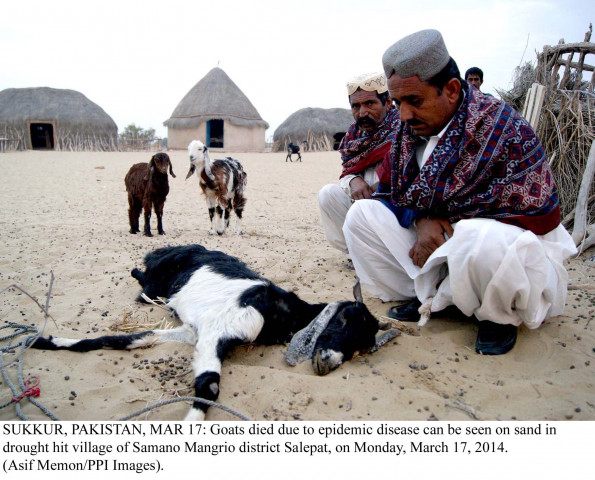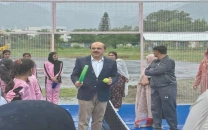Situation turns from bad to worse as desert threatens Thar’s only source of livelihood
A mysterious disease, probably borne of a lack of water, has been killing livestock.

Two people look at a goat that died of an epidemic disease. PHOTO: PPI
The area that has been hit the worst is Salehpat in the Sukkur district, where according to unconfirmed reports, hundreds of goats, cows, sheep and camels have died so far.
While these reports are claiming that thousands of animals have died due to what the villagers are calling a 'mysterious disease', independent sources are putting the number of dead animals in the hundreds.
Reporters based in Salehpa quote villagers as saying that some of the residents have lost whole herds of goats, sheep and cows while others have lost dozens. The villagers claim that the animals first avoid eating fodder and drinking water - which shows that they may be having some problem in their throat. Later, the animals start bleeding from their mouth and nose and then die a painful death.
Some of the elders in the villages were of the view that due to acute shortage of water and rainfall, some of the trees might have turned poisonous, which is leading to throat ailment in the animals.
The plight of Thar
Reports say that the disease is being observed for the last few months but has now become a more regular occurrence. Potable water is available in only few areas of Thar - the residents of the remaining areas are either dependent upon rainfall or wells, which have turned salty.
People living in the desert are mostly dependent upon their livestock as they are unable to grow seasonal crops due to the scarcity of water. And therefore, livestock is the only means of sustainability for them.
Sukkur commissioner Dr Niaz Ali Abbasi, talking to The Express Tribune, confirmed the disease. "This disease has not emerged overnight, rather it is being observed for the last two months in different areas of the desert," he revealed. "Every step has been taken to provide veterinary cover to the affected areas. Seven teams of doctors, including vets, are visiting the affected areas on a daily basis and vaccinating the animals against the disease. The doctors are also providing medical aid to residents."
However, Abbasi conceded that these measures are temporary. "We need to take permanent measures to overcome this problem once and for all," he stressed. "During a meeting with the Sindh Chief Minister Qaim Ali Shah, the installation of reverse osmosis plants and hand pumps was suggested, so that the residents get ample water for vegetation."
Abbasi was quick to highlight the importance of vegetation to the people of the desert. "People living in the desert are dependent upon livestock and the livestock is dependent upon vegetation. If there is no vegetation, then the residents have no livelihood. I have also suggested establishing veterinary centres in the desert to provide proper guidance to the people and treatment to the animals."
Abbasi also felt that cloud seeding - the process of intentional weather modification to induce rain - is a viable option for the desert in order to produce vegetation.
"All these measures, if taken, will bring prosperity for the residents of the desert, which will naturally add to the prosperity of the province and ultimately to that of the country."
Published in The Express Tribune, March 19th, 2014.



















COMMENTS
Comments are moderated and generally will be posted if they are on-topic and not abusive.
For more information, please see our Comments FAQ